In the vibrant Jambiani Village along the Tanzanian coast, a captivating display of female artistry and resilience unfolds before visitors’ eyes. The nimble-fingered women skillfully transform humble materials like coconut husks into functional, durable ropes, all while expertly weaving doormats and crafting the iconic kanga garments that have come to symbolize the region’s rich cultural heritage. Witnessing these talented artisans at work offers a window into the community’s traditions and their crucial role in sustaining the local economy. This authentic, immersive experience promises to leave a lasting impression on those who dare to venture beyond the typical tourist traps.
Key Points
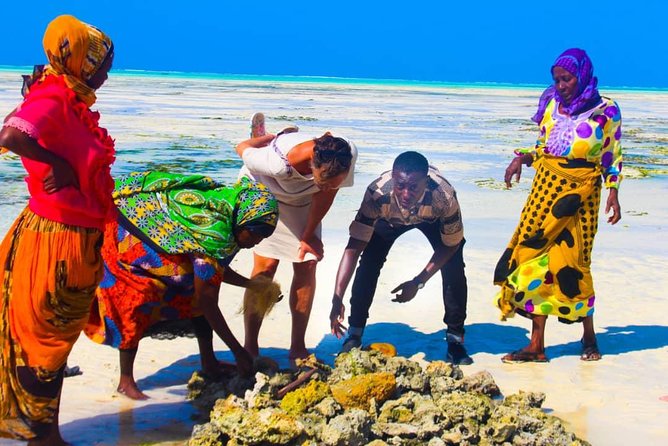
- Visitors can enjoy the lives and work of Jambiani village women through a guided tour led by knowledgeable local guides.
- Artisans skillfully demonstrate traditional craft techniques, including weaving doormats, making coconut husk ropes, and crafting vibrant kanga garments.
- The tour provides an opportunity to learn about and try hands-on traditional crafting, fostering meaningful interactions with the local artisans.
- The personalized nature of the tour ensures flexibility and a deep, authentic understanding of the community’s history, culture, and economic activities.
- The tour is not wheelchair accessible and requires the ability to walk at least 2 kilometers, but the pick-up service from Stone Town hotels is available.
Overview of the Experience
The tour of Jambiani Village provides visitors with an immersive experience, led by a knowledgeable local guide who shares insights into the lives and work of the village women.
Visitors will have the opportunity to meet local artisans and learn about their traditional crafts, such as making coconut husk rope, doormats, and vibrant kanga garments.
The tour offers a glimpse into the daily routines and livelihoods of the Jambiani community, allowing participants to gain a deeper appreciation for the skills and resilience of the village women.
With the option to enjoy a locally-prepared lunch, the tour promises an authentic and enriching cultural encounter.
You can also read our reviews of more tours and experiences in Zanzibar.
Activities and Learnings
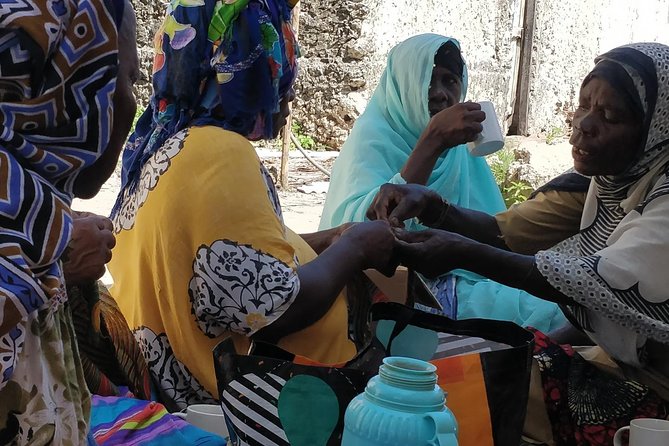
During the tour, visitors can meet local women artisans and learn about their traditional craft techniques.
They’ll discover the process of making coconut husk rope, weaving doormats, and crafting the vibrant kanga garments that are central to East African culture.
The artisans enthusiastically demonstrate their skills, sharing the stories and techniques passed down through generations.
Visitors can try their hand at weaving, feeling the texture of the coconut husks and watching the intricate patterns emerge.
They’ll gain a deeper appreciation for the time and artistry required to create these functional yet beautiful items.
The experience provides a glimpse into the daily lives and livelihoods of the Jambiani women.
Tour Details
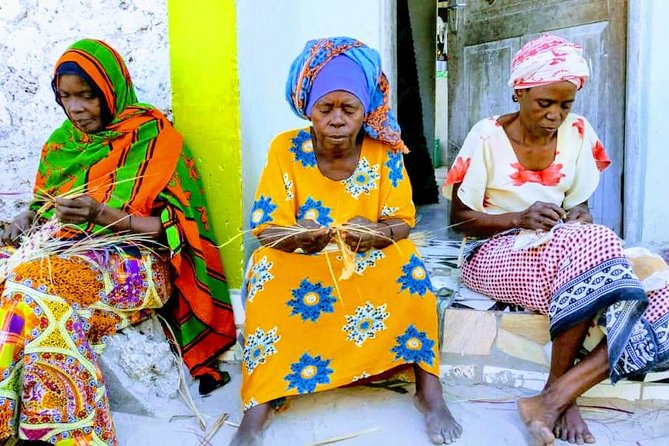
Operated by Jambiani Tours, the private nature of this tour ensures flexibility and personal attention for each visitor.
Not wheelchair accessible, the experience requires the ability to walk over 2 kilometers through the village. This allows travelers to enjoy the daily lives and traditions of the local women.
Along the way, the knowledgeable local guide shares insights into the community’s history, culture, and economic activities. The tour’s intimate setting creates opportunities for meaningful interactions, fostering a deeper understanding of the Jambiani way of life.
Whether exploring the craft workshops or observing the women at work, this unique experience offers a genuine glimpse into the vibrant fabric of the village.
Inclusions
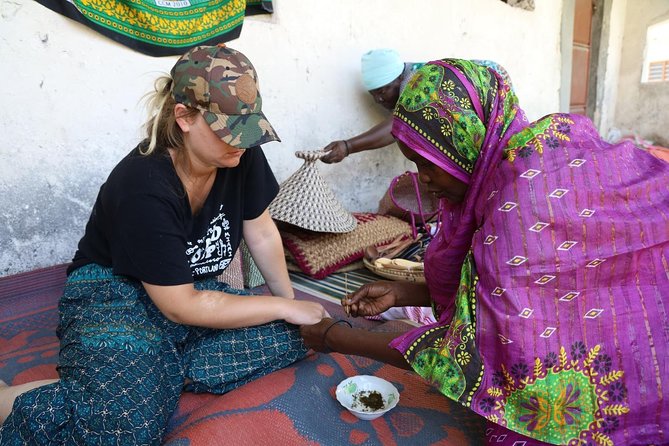
A Jambiani local guide accompanies visitors throughout the tour, sharing insights into the community’s history, culture, and economic activities.
Plus, a pick-up service is available from Stone Town hotels for an additional charge, providing convenient transportation to the village.
This personalized experience ensures that guests get a deep and authentic understanding of the lives of the local women.
Whether it’s learning about traditional crafts like coconut husk rope-making or witnessing the vibrant kanga garment production, the guide brings these activities to life with engaging commentary.
The inclusions of the tour provide a well-rounded and immersive exploration of Jambiani’s rich heritage and the hardworking women who are its heart and soul.
Booking and Cancellation

Travelers can typically receive confirmation of their Jambiani village tour booking within 48 hours, subject to availability. This tour also offers free cancellation up to 24 hours before the scheduled experience, providing flexibility for guests’ plans.
| Booking | Cancellation |
|---|---|
| Confirmation within 48 hours | Free cancellation up to 24 hours |
| Subject to availability | Before experience |
| Pick-up service available | Additional charge may apply |
| From Stone Town Hotel | – |
The booking process is straightforward, and the cancellation policy allows visitors to adjust their itinerary as needed. This thoughtful approach ensures a seamless and enjoyable experience for those eager to enjoy the vibrant culture of Jambiani village.
Local Women Artisans

Local women artisans often gather in the heart of Jambiani village, skillfully demonstrating the intricate techniques behind crafting traditional coconut husk ropes, woven doormats, and the vibrant kanga garments that have long been an integral part of Tanzanian culture.
With nimble fingers and years of experience, they deftly transform humble materials into beautiful, functional items.
Visitors are captivated as they watch the artisans work, learning how each step in the process – from harvesting the coconut husks to dyeing the fabric – requires both physical dexterity and cultural knowledge passed down through generations.
These artisanal traditions not only preserve Jambiani’s heritage but also provide vital sources of income for the village’s women.
Making Coconut Husk Rope
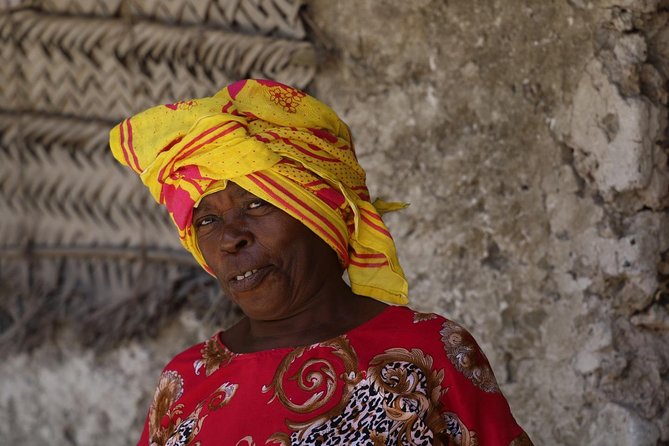
Skillfully harvesting the fibrous husks from coconuts, the women of Jambiani Village use time-honored techniques to transform the humble materials into sturdy ropes that have long been essential for their daily lives. Stripping the husks, they comb out the fibers before twisting and spinning them into strong, durable cords. These ropes are then used for an array of practical purposes, from securing fishing nets to binding bundles of firewood. The entire process is a testament to the skill and resourcefulness of these artisans.
| Materials Needed | Rope-Making Steps |
|---|---|
| Coconut Husks | 1. Harvest Husks |
| Hands/Tools | 2. Extract Fibers |
| Time, Patience | 3. Twist and Spin Fibers |
Traditional Kanga Garments

The vibrant, patterned kanga garments are a cherished part of Jambiani Village’s cultural heritage, adorning the women in rich, eye-catching fabrics.
Each kanga is a unique work of art, handcrafted with intricate designs and vibrant colors. The women proudly display their kanga as they go about their daily lives, whether tending to household chores or socializing with friends.
The tour guide explains how the traditional kanga-making process is passed down through generations, with women learning the techniques from their mothers and grandmothers.
Visitors are captivated by the artistry and skill required to create these beautiful garments, which hold deep cultural significance for the people of Jambiani.
Frequently Asked Questions
What Are the Typical Products Sold by the Local Artisans?
The local artisans typically sell handcrafted items like coconut husk ropes, doormats, and traditional kanga garments. These products showcase the women’s skilled craftsmanship and reflect the village’s cultural heritage.
Is There an Opportunity to Purchase Items From the Artisans?
Yes, the tour allows visitors to purchase handmade products directly from the local artisans, such as coconut husk rope, doormats, and traditional kanga garments. Visitors can talk with the artisans and support their livelihoods during the experience.
Are There Any Cultural Performances or Demonstrations During the Tour?
The tour includes cultural demonstrations, where visitors can witness local women artisans showcasing their traditional skills in crafting coconut husk ropes, weaving doormats, and creating vibrant kanga garments. These live performances provide an immersive cultural experience.
What Is the Average Duration of the Tour?
The tour typically lasts around 2-3 hours, allowing visitors ample time to enjoy the village’s traditions and witness the skilled craftsmanship of the local women artisans up close.
Are There Any Restrictions on Photography During the Tour?
The tour allows photography, but visitors should be respectful of the local women and ask for permission before taking their photos. Some areas may have restrictions to protect the privacy of the artisans.
Recap
Jambiani’s women artisans demonstrate their extraordinary skills, transforming humble materials into captivating products that preserve cultural heritage.
Visitors can witness their nimble fingers at work, weaving vibrant kangas and crafting durable ropes from coconut husks.
These talented artisans offer a meaningful, authentic understanding of the local community and its vital role in sustaining the economy through their remarkable creativity and resourcefulness.
More Tour Reviews in Zanzibar
Not for you? Here's more things to do in Zanzibar we have recnetly reviewed
- Private Transfer by Car in Zanzibar
- Stone Town Private Walking Tour
- Zanzibar Excursions
- 3-Hour Private Stone Town Walking Tour
- Stone Town and Prison Island From Zanzibar
- Zanzibar Stone Town Historical Tour and Spice Farm Tour
- Skydive Zanzibar | Tandem Skydive
- Stone Town Private Tour With Slave Market Tickets
- Stone Town Tour
- Selous Luxury Day Safari With Photographer
- A Private Full Day Tour To Stone Town & Spice Farm
- Full Day Safari Blue Zanzibar
